Tweedy Surname Ancestry ResultsOur indexes 1000-1999 include entries for the spelling 'tweedy'. In the period you have requested, we have the following 161 records (displaying 1 to 10): Single Surname Subscription | | | Buying all 161 results of this search individually would cost £838.00. But you can have free access to all 161 records for a year, to view, to save and print, for £100. Save £738.00. More... |
These sample scans are from the original record. You will get scans of the full pages or articles where the surname you searched for has been found. Your web browser may prevent the sample windows from opening; in this case please change your browser settings to allow pop-up windows from this site. Scottish litigants, rebels and cautioners: excluded names
(1569-1578)
The Privy Council of Scotland exercised a superior judicial authority in the kingdom, and consequently received and dealt with a constant stream of petitions, as well as dealing with the internal security of the state. This register of the council from July 1569 to June 1578, in the reign of king James VI, was edited by John Hill Burton, Historiographer Royal for Scotland, and published under the direction of the Lord Clerk Register of Scotland in 1878. Some of the individuals mentioned are the complainants, those of whom they complained, and the sureties on both sides: at this period, some of the complainants are alleging serious attacks, often of a feuding nature. Many of the bonds entered into by the cautioners are promises to keep the peace towards such enemies. Failure to answer to the council when summoned was a serious contempt, leading to being denounced a rebel, with serious consequences. But 'horning' was also used in the pursuit of debts: there was no imprisonment for debt in Scotland, but a creditor could have an obstinate debtor ordered, in the sovereign's name, to pay what was due, failing which, the debtor could be put to the horn, denounced as a rebel, and imprisoned as a rebel. In his preface to the first volume, Burton remarked that "There might perhaps be objections to the abundance of names of persons and places unknown to fame; but it was considered that in such a work the proper names of all persons and places occurring in the Register should be preserved, to be at the service of genealogical as well as historical investigators". But by this, second, volume, he decided that complete coverage was impractical, with "the crowding in of proper names, all but a few being the names of obscure persons ... Borderers are called up in considerable groups, and ordered to find, or recorded as having found, sureties for giving compensation to persons plundered, or for good conduct for the future. Several burgesses are sometimes entered in a minute about a Corporation quarrel. When the particulars of unimportant private litigations are omitted, the names remain." He therefore devised this 'Index of Names excluded from the Text', giving name, conditions, and date in register.
TWEEDY. Cost: £4.00.  | Sample scan, click to enlarge

| Official Papers
(1645-1647)
The State Papers Domestic are the main series of records of internal British administration for this period. The volumes printed in abstract here (Charles I dx to dxv) run from July 1645 to December 1647, a period of defeat of royal power by the parliamentary forces. Parliament's victory at Naseby in June 1645 led to the collapse of the Royalist cause and the imprisonment of the king in Carisbrooke Castle towards the close of 1647. During all these events the administration of government continued, largely using the same institutions, leaving similar series of records as before: but executive power is now represented in these books by the Committee of Both Kingdoms (England and Scotland). The State Papers Domestic for these years are largely concerned with the prosecution of hostilities, the movements and supply of troops, and the treatment of 'delinquents'. Chronologically interleaved with the abstracts of the main volumes are details from the series of Proceedings of the Committee of Both Kingdoms, but these are lost for the years 1646 to 1647, brief notes only surviving in the Indexes to the Day Book of Orders. There are also appendices relating to the victualling and disposition of the Navy, taken from the Letters and Papers of the Committee for the Admiralty and the Committe of the Navy, which also include some petitions from sailors, victuallers, officials, or their dependants, seeking redress or relief.TWEEDY. Cost: £4.00.  | Sample scan, click to enlarge
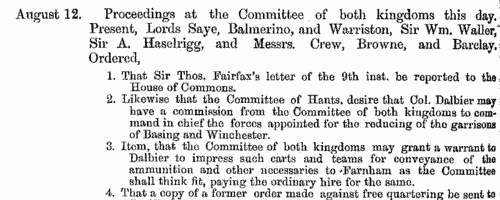
| Official Papers
(1648)
The State Papers Domestic cover all manner of business relating to Britain, Ireland and the colonies, conducted in the Committee of Both Houses held at Derby House, as well as other miscellaneous records. These records are from January 1648 to January 1649.
TWEEDY. Cost: £4.00.  | Sample scan, click to enlarge

| London Marriage Allegations
(1611-1660)
London, Essex and part of Hertfordshire lay within the diocese of London. In the later 17th century the individual archdeaconry courts issued marriage licences, but for this period the only surviving material is from the overarching London Consistory court. The main series of marriage allegations from the consistory court was extracted by Colonel Joseph Lemuel Chester, and the text was edited by George J. Armytage and published by the Harleian Society in 1887. A typical later entry will give date; name, address and occupation of groom; name, address and condition of his intended bride, and/or, where she is a spinster, her father's name, address and occupation. Lastly we have the name of the church where the wedding was going to take place. For the later years Colonel Chester merely picked out items that he thought were of interest, and his selections continue as late as 1828, but the bulk of the licences abstracted here are from the 17th century.TWEEDY. Cost: £4.00.  | Sample scan, click to enlarge

| Suffolk householders
(1674)
Hearth tax was raised by assessing each householder on the number of chimneys to the dwelling. This provided a simple way to make a rough judgment as to the value of the dwelling: paupers were issued exemption certificates, but they too were listed at the end of each return. The returns were made by township, grouped by hundred. A complete copy of the hearth tax return for each shire was sent to the Exchequer: this is the return for Suffolk for Lady Day (25 March) 1674 (E 179/257/14) as printed in 1905 as Suffolk Green Book no xi, vol. 13. The numbers given are the numbers of hearths: where two or more people are grouped together with one number, it may be assumed that they were heads of separate households sharing a single building with that number of chimneys.TWEEDY. Cost: £6.00.  | Sample scan, click to enlarge

| Official Papers
(1660-1681)
The State Papers Domestic cover all manner of business relating to Britain, Ireland and the colonies, conducted in the office of the Secretary of State as well as other miscellaneous records. TWEEDY. Cost: £4.00.  | Sample scan, click to enlarge

| Treasury and Customs Records
(1685-1688)
Government accounts, with details of income and expenditure in Britain, America and the colonies
TWEEDY. Cost: £4.00.  | Sample scan, click to enlarge
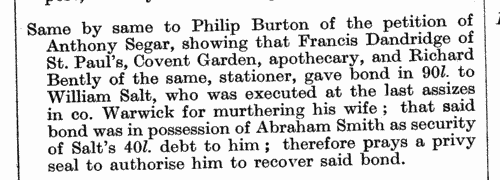
| Treasury Books
(1689-1692)
Records of the Treasury administration in Britain, America and the colonies.
TWEEDY. Cost: £4.00.  | Sample scan, click to enlarge
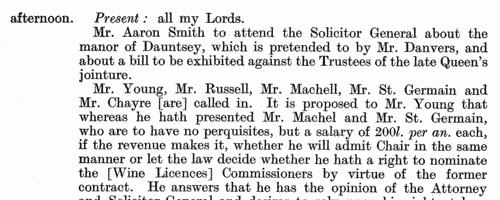
| State Papers Domestic
(1699-1700)
The State Papers Domestic cover all manner of business relating to Britain, Ireland and the colonies, conducted in the office of the Secretary of State, as well as other miscellaneous records. 1 January 1699 to 31 March 1700.
TWEEDY. Cost: £4.00.  | Sample scan, click to enlarge
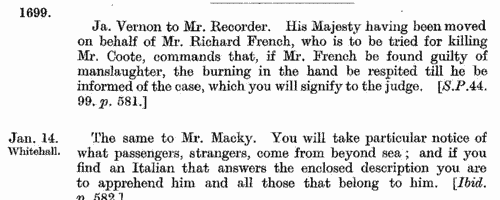
| Licences for marriages in southern England
(1632-1714)
The province or archbishopric of Canterbury covered all England and Wales except for the northern counties in the four dioceses of the archbishopric of York (York, Durham, Chester and Carlisle). Marriage licences were generally issued by the local dioceses, but above them was the jurisdiction of the archbishop. Where the prospective bride and groom were from different dioceses it would be expected that they obtain a licence from the archbishop; in practice, the archbishop residing at Lambeth, and the actual offices of the province being in London, which was itself split into myriad ecclesiastical jurisdictions, and spilled into adjoining dioceses, this facility was particularly resorted to by couples from London and the home counties, although there are quite a few entries referring to parties from further afield. Three calendars of licences issued by the Faculty Office of the archbishop were edited by George A Cokayne (Clarenceux King of Arms) and Edward Alexander Fry and printed as part of the Index Library by the British Record Society Ltd in 1905. The first calendar is from 14 October 1632 to 31 October 1695 (pp. 1 to 132); the second calendar (awkwardly called Calendar No. 1) runs from November 1695 to December 1706 (132-225); the third (Calendar No. 2) from January 1707 to December 1721, but was transcribed only to the death of queen Anne, 1 August 1714. The calendars give only the dates and the full names of both parties. Where the corresponding marriage allegations had been printed in abstract by colonel Joseph Lemuel Chester in volume xxiv of the Harleian Society (1886), an asterisk is put by the entry in this publication. The licences indicated an intention to marry, but not all licences resulted in a wedding. TWEEDY. Cost: £4.00.  | Sample scan, click to enlarge
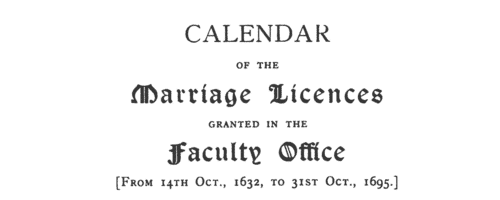
|
Research your ancestry, family history, genealogy and one-name study by direct access to original records and archives indexed by surname.
|












